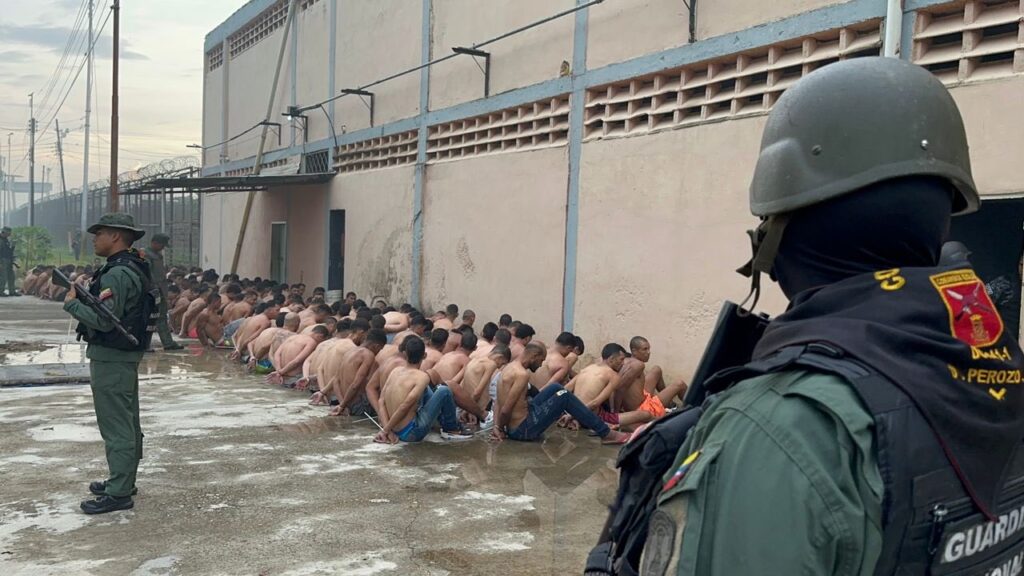At the ICC, the Perpetrator is Playing the Victim
Maduro is buying time at The Hague by fabricating absurd claims and hiring a prestigious British human rights lawyer. But Prosecutor Khan is not releasing the pressure
Following the Tocorón strategy, the Maduro government has militarily taken over other five prisons. Are pranatos, as we know them, coming to an end?
Maduro is buying time at The Hague by fabricating absurd claims and hiring a prestigious British human rights lawyer. But Prosecutor Khan is not releasing the pressure
The Venezuelan regime –the country’s main promoter of mining– has recently launched a series of highly publicized operations against gold extraction in Cerro Yapacana. Are they working? Or is it just a propagandistic bluff?

Following the strategy to take over the Tocorón crime-city-bunker-resort, run by the mega-gang Tren de Aragua, the government of Nicolás Maduro has militarily taken over five more prisons in Venezuela in the last few weeks: Tocuyito, La Pica, Puente Ayala, Vista Hermosa and La Cuarta.
According to the Venezuelan Observatory of Prisons, before the operations began, only 11% of Venezuela’s inmate population was under state control: the rest were either under “pranatos” (46%)—feudoms controlled by gang leaders—or mixed pranato-state systems (43%).
According to open-source intelligence specialist Andrei Serbin Pont, in his piece for Caracas Chronicles, the prison takeovers are part of a “shift in the Venezuelan regime’s security strategy” to deal with “criminal insurgencies across the country” and retake the territory under State control. You can read his superb piece here.
Six questions to assess whether events in the Middle East can affect Venezuelan oil and politics
The rump version of one Venezuela’s oldest parties, the Catholic-influenced Copei, just established an alliance with an evangelical party to oppose abortion, sex-ed and gay marriage. Will Christian conservatism grow within the opposition too?
Ecoanalítica projects three possible scenarios following the sanctions relief license: one in which the license is renewed, one in which the license isn’t and Venezuela returns to the 2023 status quo, and one in which sanctions are deepened
Despite the health crisis that Venezuela has gone through, the onchocerciasis elimination program in Venezuela has continued to work reasonably well. One of its leading scientists explains why
On November 1823, the last Spanish force remaining in the former colony surrendered after resisting for more than two years at the Puerto Cabello castle. But this date is not celebrated officially. Why?
Following the Mexican and Cuban traditions of blaming drug trafficking on the US and describing economic sanctions as blockades, the Chavista ruler joins a regional leftist effort to use the migratory crisis as a political opportunity
The judicial persecution of the National Commission of Primaries continues after the post-mortem “suspension” of the opposition primaries. On Monday, the president and vice-president of the Commission’s Lara regional board had to appear in the Public Ministry again as they are both being investigated.
Yet, for now, none of the members has been prosecuted.
“The primaries are not voidable. The Court can say whatever it wants, but the factual fact is there, it is irreversible,” María Corina Machado said , “so I don’t think this implies that the [Barbados] agreement has been violated, not yet. The regime is pushing the limits but it has not yet been broken.”
The largest solo exhibition of the late Venezuelan-American visual artist just opened in Montreal before going to three other museums in the US. With more than 250 pieces, it reframes for today’s sensibilities the vision of a woman ahead of her times
The U.S. issued a license authorizing operations with the state-owned mining company, but experts believe it could just deepen the Arco Minero policies
My first vacations out of Maracaibo in many, many years made me discover the beautiful and bizarre country I live in
Negotiating with the opposition created winners and losers within Chavismo. With the government about to blow it up by prosecuting the National Commission of Primaries, will the winners save it?